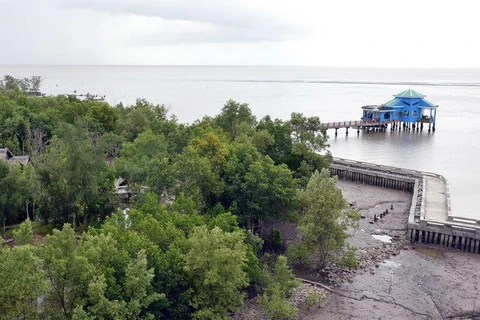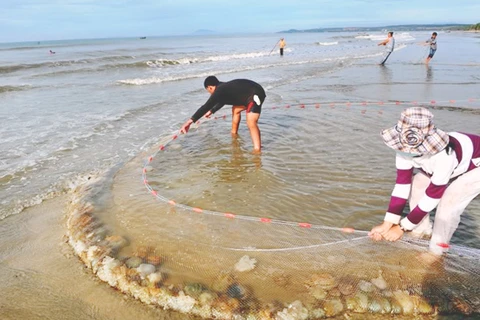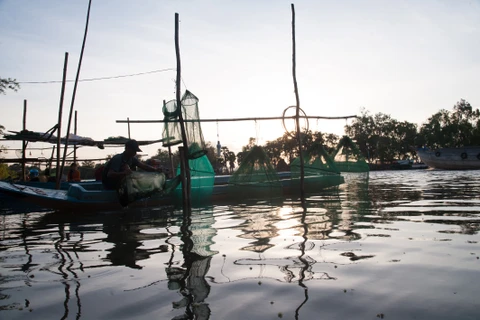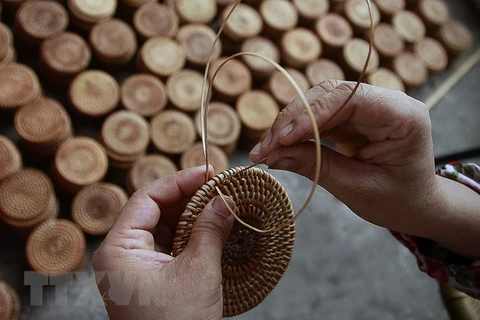 Farmers harvest clams at the Rang Dong Clam Co-operative in Ben Tre Province’s Binh Dai district ( Source: VNA)
Farmers harvest clams at the Rang Dong Clam Co-operative in Ben Tre Province’s Binh Dai district ( Source: VNA)Tien Giang (VNS/VNA) - Clam farmers in the Mekong Delta province of Tien Giang are finding innovative solutions to produce sustainable value chains in an aim to meet international standards.
In recent years, declining fishery stocks, disease, and environmental impacts have affected both quantity and quality of clams (meretrix lyrate) in the province.
To improve value and enhance the competitiveness of local clam farming, a new project has begun since 2013, according to Nguyen Tien Diet, head of Fisheries Division under the province’s Department of Agriculture and Rural Development (DARD).
Under the project, Tan Thanh commune authorities in Go Cong Dong district and local clam farmers are working together to achieve the Marine Stewardship Council (MSC) certification, which is the world’s most credible and recognised standard for environmentally sustainable wild-caught seafood.
Nguyen Quoc Minh, Vice Chairman of the Tan Thanh commune People’s Committee, said six community-based groups of clam farmers have been established in the locality, including 150 households that are breeding clams on 1,600ha.
Each group has a leader and a management board who work as volunteers without a salary.
Tran Van Chi, 65, a local clam breeder, said the current price of fresh clams is around 20,000 VND (0.88 USD) per kilo.
Clam farmers can earn a profit of 50 million VND (2,190 USD) per hectare each year, making up about 40 percent of local farmers’ incomes, he said.
To achieve those results, the commune’s clam farming sector has worked for over four years to achieve the MSC standards, but funds are still needed to see the completion of the certificate issuance from MSC.
Meanwhile, earlier in 2009 Ben Tre Province’s small-scale, community-based clam fishery sector became the first one in Southeast Asia that met MSC standards and was granted the certification.
Ben Tre’s MSC certification process was co-sponsored by the province’s DARD and World Wide Fund for Nature (WWF).
Local co-operatives in the province have closely managed and carefully surveyed the brood stock and harvestable clams within their area.
Tran Thu Nga, Director of the Centre for Transfer of Technology – Services and Community Development for Vietnamese Agriculture – Fisheries under the Vietnam Fisheries Society, said the seafood sector faces challenges in finding markets as well as environmental concerns.
The MSC Fisheries Standard helps cope with the global trend of over-fishing and the degradation of the marine environment.
“The MSC certification will help local clam breeders reach out to consumers worldwide,” Nga said.
Raising local residents’awareness of sustainable development plays an important role in building a sustainable production model in Ben Tre province, Nga added.
Clams are one of five key fishery products in the province besides tra fish, tiger prawns, blue-legged prawns and white-legged shrimp, Nguyen Van Buoi, Deputy Director of Ben Tre province’s Department of Agriculture, said.
“Over the past 10 years, local clam farming has increased significantly in productivity, especially of clam seeds,” he added.
Covering 65km of coastal areas, the province is home to over 4,000 hectares of clam farming, mostly in Ba Tri, Binh Dai and Thanh Phu districts.
Working with their farmers, the cooperatives can produce about 4,500-5,000 tonnes of fresh clams per year, Buoi said.
MSC certification has helped increase the local clam price by 5,000-10,000 VND (0.22-0.44 USD) per kilo compared to the clam rates harvested by other localities in the country.
The cooperatives’average annual revenue in recent years has risen to 75 billion VND (3.3 million USD) and even jumped to 110 billion VND (4.8 million USD), greatly improving their members’incomes.-VNA
VNA
























